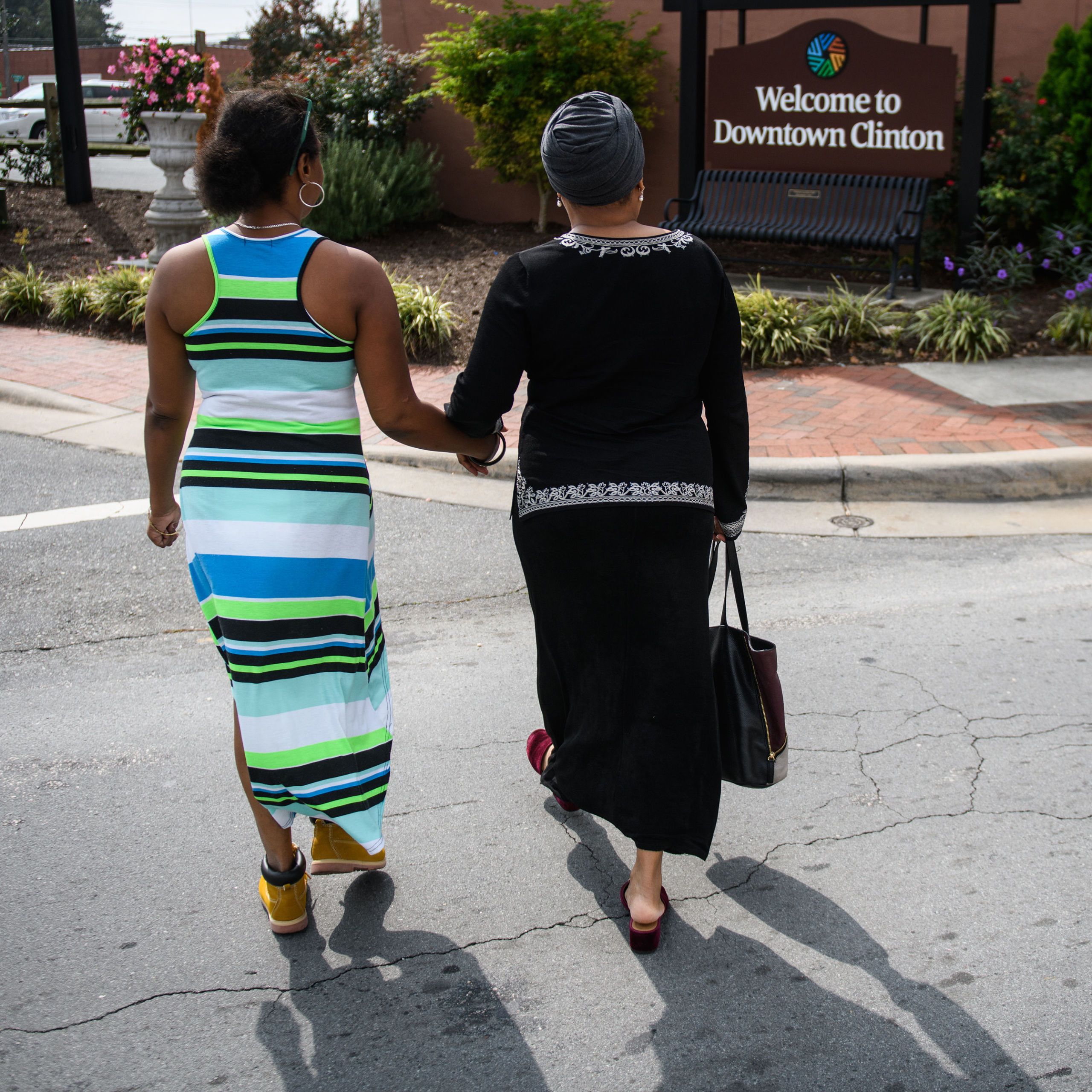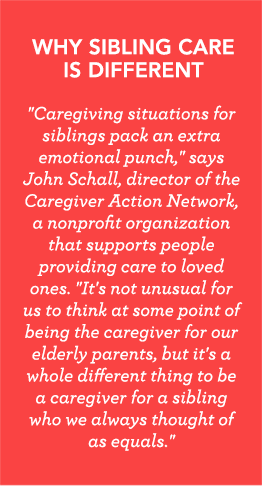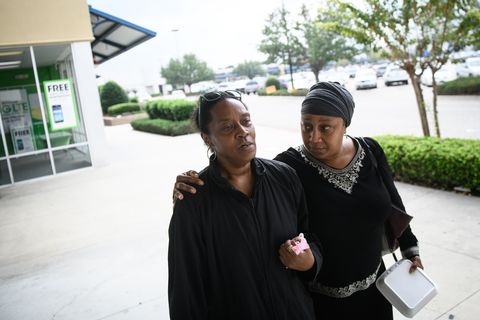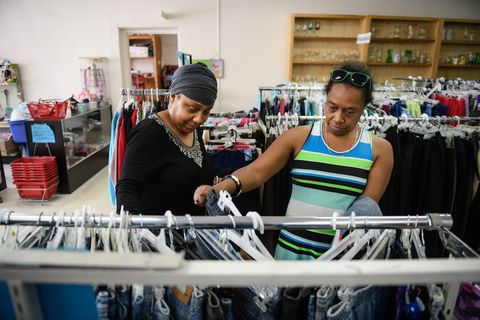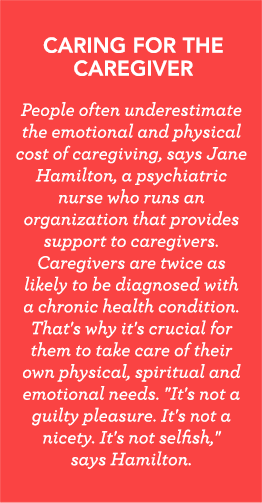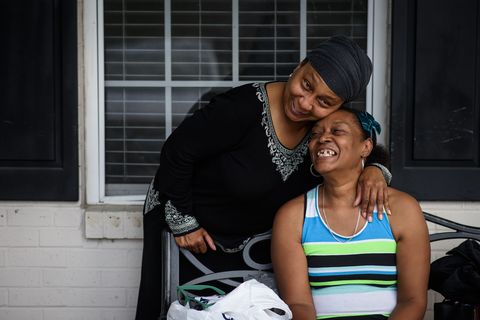When sisters Jean and Ruby were growing up in Harlem, they used to play a game they called "Eartha." The two little girls put on their prettiest dresses and shiniest shoes, and sat down to tea as grown-up ladies. It was a game of make-believe as they discussed the details of their hoped-for husbands and children, and all the exciting things they would do together.
But 45 years later, the sisters' lives aren't what they imagined. Ruby Wilson, 54, has paranoid schizophrenia and lives in an assisted living facility in North Carolina. Her sister Jean Moore, 56, a nonprofit consultant who lives in Maryland, is her legal guardian.
Though their relationship, marred by mental illness, has not been simple, the connection is unique. "Our bond is inseparable," says Jean. "You know when you put sugar in tea and it just dissolves? Yeah, it's like that."
THINGS FALL APART
Ruby and Jean, just two years apart, were raised almost like twins. "They used to say our name as JeannieandRuby. It was like one person," says Jean. They dressed in identical outfits and went together to piano lessons and ballet classes.
But when the girls became teenagers, their lives began to diverge. Jean was focused on school, while Ruby was more of a social butterfly. In high school, Ruby started experimenting with drugs. Ruby had her first baby at the age of 17 and quickly fell into a depression.
As sadness descended into psychosis, she was diagnosed with paranoid schizophrenia. Whenever she had a psychotic episode, Ruby would be hospitalized. But her treatment was scattered and inconsistent over the next 35 years, and she continued to spiral downward. (Schizophrenia affects about 1 percent of Americans and is believed to be caused by a combination of genetic and environmental factors with patients suffering from hallucinations, delusions and difficulty focusing; usually, symptoms begin between 16 and 30 years old.)
Meanwhile, Jean went to college, got married and spent a decade in the military overseas. She went to law school, got divorced, and spent a few years doing development work in Africa. By the time she returned to the United States in and met her second husband, Ruby had become estranged from the family and was living on her own—eating at food kitchens and staying in shelters—in Little Washington, North Carolina. (Her son was sent back to Harlem to live with Ruby and Jean's mother.)
"I just couldn't stand knowing she was in that condition and not getting the help she needed," says Jean. So she drove down to North Carolina to find her sister. After asking around in the small town, she found Ruby walking the streets.
For Jean, one thing is certain: "Ruby's a survivor."
MAKING IT OFFICIAL
At first, Jean's role caring for her sister and trying to manage her medical treatment was unofficial. Jean continued to visit North Carolina from her home in Maryland as often as possible to "scout Ruby out" and make sure she was surviving.
In 2010, Jean got a call from a case manager. Ruby would become a ward of the state unless Jean wanted to become her legal guardian instead. So Jean stepped up, formalizing the role she'd been serving for years.
The new role gave Jean more power to get access to Ruby's health information and to help to keep her safe, but finding the appropriate care for Ruby remained a challenge. "You have to be so proactive as a guardian. It's a full-time job," said Jean.
OBSTACLES TO CARE
In the past, hundreds of thousands of patients like Ruby were housed in state mental hospitals. Most of those hospitals were closed beginning in the 1960s, as part of the "deinstitutionalization" movement to get people with mental illnesses back into the community. But today, alternative housing arrangements can be scarce and imperfect, leaving many people with serious mental illnesses homeless or in jails or shelters. Jean didn't want that for her sister.
But each time she tried to get help for Ruby, something seemed to go wrong. Ruby would refuse to take medication and then disappear for long periods, only surfacing again when she was arrested or sent to a psychiatric hospital. "For a while, it was like a revolving door in and out of the hospital," says Jean.
Every time Ruby was discharged, it was an enormous struggle to find somewhere for her to live. Part of Ruby's mental illness is that she doesn't recognize she is sick, which made her a difficult patient; she refused to take her medications and tried to run away several times.
Some facilities refused to accept her because she was considered a flight risk. Others said they were full or did not accept her insurance. Others were unaffordable; the money Ruby gets each month from Social Security often wasn't enough to pay for the cost of the private facilities where space was available.
The hospital staff would call dozens of group homes and assisted living facilities before landing on one that would agree to accept Ruby. The placements never lasted long. The facilities were supposed to be secure, but Ruby would inevitably run away and end up back at another psychiatric hospital, only to repeat the process. "It's like staying on a wild horse," said Jean. She started to worry that the right place for Ruby might not exist.
A HOME FOR RUBY
During a recent hospitalization, Ruby received an additional diagnosis of memory loss and was accepted into the locked memory unit of the assisted living facility in Clinton, which is usually reserved for dementia patients. It's the most secure facility she's been in so far, and Jean is pleased with her progress over the past year. Ruby has become more stable, even-tempered, personable and pleasant. Her old sense of good humor has started to return, and in her better moments, she appreciates what Jean does for her.
"Jean is splendid," says Ruby. "She's always on time. She's very considerate. She's very caring. She's very nurturing."
The sisters talk every week, but Jean only has time to visit every month or so, and then she can only stay for a day. She worries it isn't enough. Ruby has few other visitors. It's hard for their mother to make the trek from the apartment in Harlem where she still lives. Ruby has 11 grandchildren and a great grandchild who live in North Carolina and Maryland, but she hasn't seen them in years. That means Jean is Ruby's last real link to the outside world, and her visits are the only time Ruby gets to leave the facility.
Jean's thought about moving down to North Carolina but she has her own husband, job and life to consider.
FIGURING OUT THE FUTURE
Over the years, Jean has tried to embrace her many complex feelings by becoming active with the National Alliance on Mental Illness, a support and advocacy group for families of people with mental illness. "I think of it as a way to fight. Becoming an advocate offers an avenue to vent."
Trying to plan for Ruby's future remains a painful struggle, even after all these years. The sisters have a history of mental illness in their family, and sometimes Jean wonders, why did this illness fall on Ruby and not her?
"Ruby was always so full of life. She was the more attractive one, more stylish, she knew all the people on our block, she was social. And she was the one who had the children," said Jean. More than anything, Jean says she wishes she could have protected her little sister from the devastating effects of her illness.
In Ruby, Jean sees the person she might have been had their fortunes been reversed. "What rises to the top for me is this enormous amount of love that I have for my sister," says Jean. And in Jean, Ruby sees a caretaker. "She's really like a mother figure to me," says Ruby.
JeannieandRuby, so close they could be twins.
HOW TO FIND HELP
An estimated 8.4 million Americans are caregivers to adult loved ones with a mental illness, most often a son or daughter, parent, spouse or sibling. Yet more than half of caregivers are dissatisfied with the availability of mental health community services in their loved one's area, and three-quarters feel high emotional stress. Three resources that can help you find relief:
This article is part of an editorial partnership between Woman's Day and Kaiser Health News.
